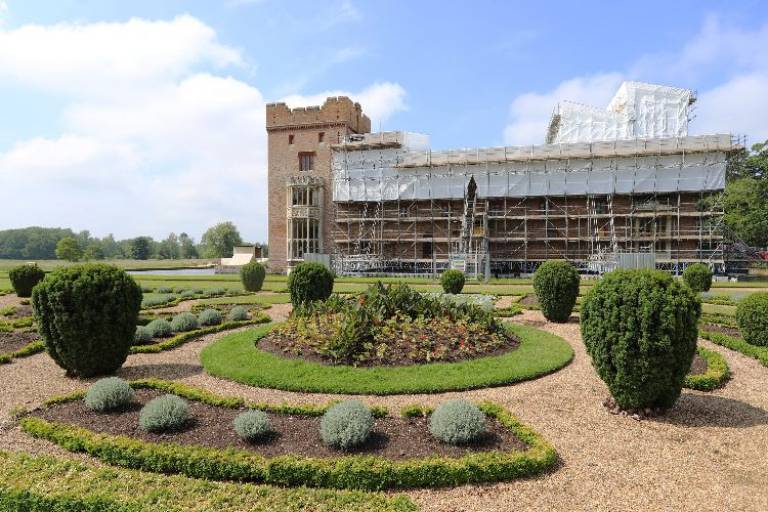Changing international heritage practice and understanding
Professor Rodney Harrison brought together heritage practitioners with diverse institutes around the world to think about shared issues and adopt more sustainable and resilient conservation practices.

12 April 2022
We conserve heritage for the benefit of future generations – yet few heritage organisations or policymakers think in concrete terms about when the futures they are working for will take place, who will be in them, or how their present-day work will influence them.
‘Futures studies’ is a diverse field which uses both historical and current social, ecological and political contexts to theorise possible or probable future scenarios. Such studies aim to empower researchers and others to shape desired futures more actively and accurately.
UCL Institute of Archaeology’s Professor Rodney Harrison has been particularly influential in bringing these analyses to the world of heritage conservation, transforming our understanding of heritage to encompass all forms of human inheritance – not just artefacts and buildings, but climate change and nuclear waste too.
More sustainable and resilient conservation practices
Through the Heritage Futures (HF) research programme, Professor Harrison has brought together heritage professionals from a range of sectors to consider shared issues and adopt more sustainable and resilient conservation practices.
From a nuclear waste storage repository in Sweden to the changing coastal environments of Orford Ness, the projects have encouraged collaborative and cross-disciplinary thinking.
Workshops with diverse partners such as IUCN, ICOMOS, Kew Gardens, the Alan Turing Institute, the British Library and a range of international museums and archives have explored contemporary heritage collecting and categorizing practices, examining how these influence the definition and management of different forms of heritage, providing at the same time professional development for participants.
Manchester Museums collaborated with HF on an exhibition designed to change how its 420,000 visitors understood heritage and its role in building futures. After attending the exhibition, audiences reported changing their perspective on heritage, now recognising its role in shaping the future.
HF’s themes also inspired further museum activities to engage partners and local communities, with the ‘Heritage Futures Studio’ funding creative projects, events and exhibitions by local groups reaching audiences of over 100,000.
Professor Harrison’s subsequent collaboration with the Glasgow Science Centre, ‘Reimagining Museums for Climate Action’, exhibited in advance and as part of COP26 from July to November 2021.
A unique space for collaboration
Artist commissions and activities inspired by HF themes of uncertainty (Martin Kunze, Karen Guthrie), transformation (Antony Lyons), diversity (Nancy Campbell) and profusion (Shelley Castle) have brought its concepts to life for new audiences.
Artist Anthony Lyons’ involvement led to two year-long artist residencies hosted by project partners (Orford Ness National Trust site and Wheal Martyn Museum) and another by the Elan Valley, Wales, where his site-specific artworks have reached almost 40,000.
Castle and HF co-created a project focusing on the values people invest in objects in their home environment, culminating in the creative community installation ‘Human Bower’.
For Kunze, founder of Memory of Mankind (MOM), a global time capsule project which aims to stores data on stable ceramic disks for a million years into the future, HF activities provided unique space for collaboration.
Shaping future funding priorities
Professor Harrison’s findings have also influenced the types of research funded by the Arts and Humanities Research Council (AHRC), which funds 75% of all UK academic heritage research.
Professor Harrison re-drafted the AHRC’s Future Heritage Research Strategy, defining key priority areas to guide decision-making, such as sustainable management of heritage, heritage and climate change and future heritages. In this way, his work has shaped the research funding landscape to improve approaches in managing natural and cultural heritage, in the UK and internationally.
Research synopsis
Heritage futures: changing international heritage practice and understanding
Through a series of connected research projects about heritage futures, UCL Institute of Archaeology’s Professor Rodney Harrison has brought together heritage practitioners with institutes around the world to think about shared issues and adopt more sustainable and resilient conservation practices. This has changed thinking about heritage, inspired artworks and exhibitions and directly shaped AHRC funding priorities for heritage research.
Links
- Professor Rodney Harrison’s academic profile
- UCL Institute of Archaeology
- UCL Faculty of Social & Historical Sciences
- UCL Faculty of Social & Historical Science REF 21
Image source credit - National Trust images, Mike Selby
 Close
Close

